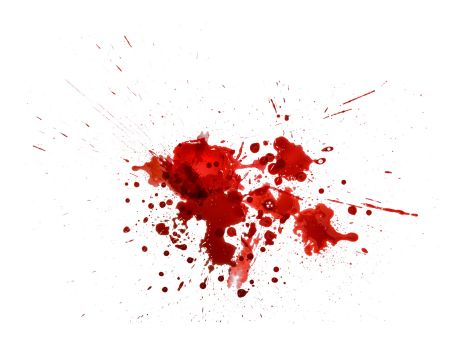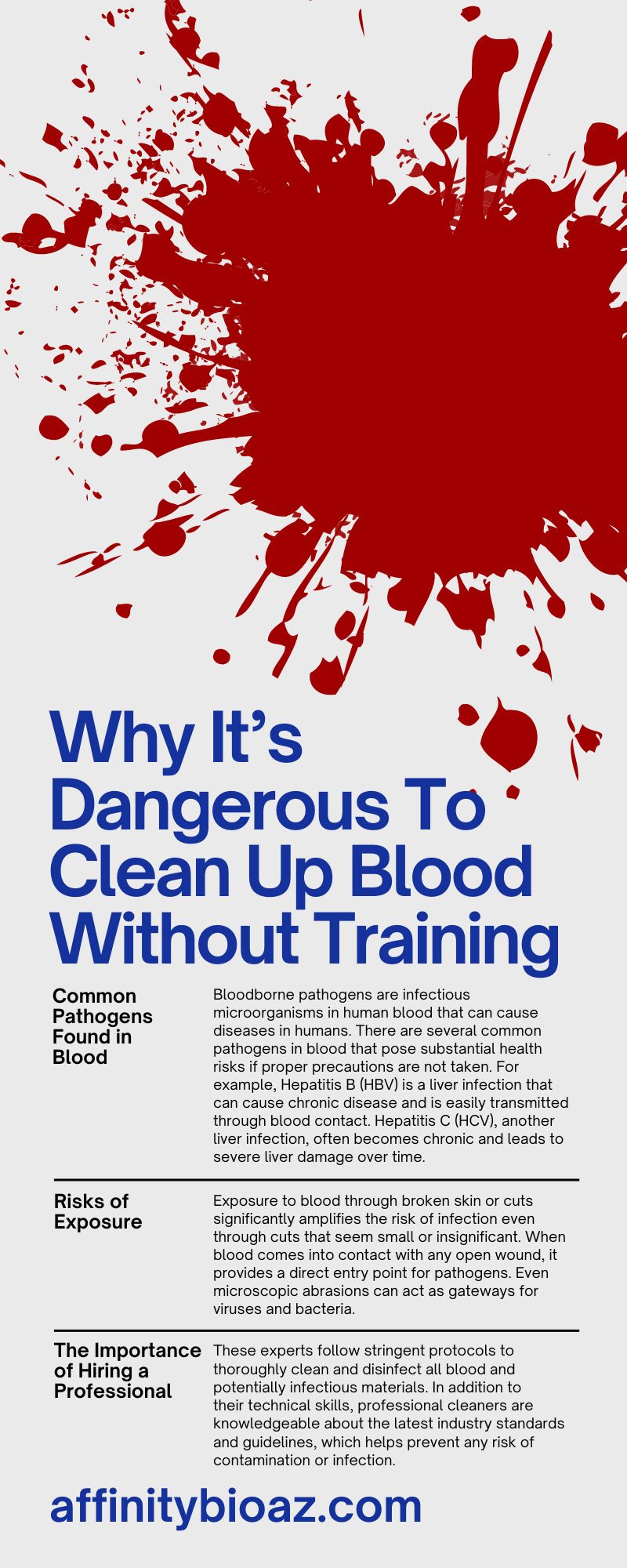
Bodily fluids of any kind can host harmful pathogens that put our health, and even our lives, at risk. Blood is no different and can carry a host of diseases, viruses, and bacteria that can lead to severe infections.
Cleaning up blood may seem like a simple, straightforward task, but without the right training, you may be putting yourself in a dangerous situation. Before you pick up that disinfectant, take a look at what you might be exposing yourself to without the proper handling knowledge.
Common Pathogens Found in Blood
Bloodborne pathogens are infectious microorganisms in human blood that can cause diseases in humans. There are several common pathogens in blood that pose substantial health risks if proper precautions are not taken. For example, Hepatitis B (HBV) is a liver infection that can cause chronic disease and is easily transmitted through blood contact. Hepatitis C (HCV), another liver infection, often becomes chronic and leads to severe liver damage over time.
Additionally, human immunodeficiency virus (HIV) attacks the body’s immune system, making it harder to fight off infections. It’s also important to be aware of Methicillin-resistant Staphylococcus aureus (MRSA), a bacterium causing difficult-to-treat infections in various parts of the body.
Proper training in blood cleanup is crucial in these situations because these pathogens can survive outside the body for several hours or even days, increasing the risk of infection. Personal protective equipment (PPE), such as gloves, masks, and protective eyewear, is essential when handling blood.
Risks of Exposure
Broken Skin or Cuts
Exposure to blood through broken skin or cuts significantly amplifies the risk of infection even through cuts that seem small or insignificant. When blood comes into contact with any open wound, it provides a direct entry point for pathogens. Even microscopic abrasions can act as gateways for viruses and bacteria.
For instance, if you have a minor cut on your hand while cleaning up blood, this small opening can become a conduit for deadly pathogens to enter your bloodstream. As a result, infections can spread, leading to severe health complications. It’s crucial to avoid any attempts to clean up blood without proper training and appropriate safety measures.
Contact With Mucous Membranes
Another significant risk factor for bloodborne pathogen exposure is contact with mucous membranes. Mucous membranes line various cavities in our body, including the eyes, nose, and mouth, and are especially susceptible to infections. Any accidental contact with these areas when cleaning up blood can allow pathogens to enter your system rapidly.
Imagine wiping up a spill and inadvertently rubbing your eye. This momentary lapse in judgment could have severe consequences. In these scenarios, hiring a trained professional becomes vital. Professionals not only use appropriate protective equipment but also follow stringent protocols to ensure no part of their body is exposed to harmful pathogens during the cleanup process.
Secondary Exposure From Improperly Disposed Materials
Improper disposal of blood-contaminated materials is a common yet gravely dangerous mistake. When blood-soaked items like cloths, tissues, or gloves are not disposed of correctly, they continue to pose a risk far beyond the initial cleanup. These contaminated materials can harbor bloodborne pathogens, which can remain infectious for considerable periods.
Picture unknowingly handling a blood-contaminated cloth while taking out the garbage—such secondary exposure can lead to unexpected and severe health issues. This is why it’s imperative never to attempt blood cleanup without proper training.
Professional biohazard cleanup services strictly follow disposal protocols to ensure all contaminated materials are safely and thoroughly eliminated. They use specialized containers and follow regulatory guidelines to prevent any secondary hazards, ensuring your environment remains safe. By opting for professional services, you safeguard your health and that of others, avoiding the hidden dangers associated with improper disposal.
The Importance of Hiring a Professional
Hiring a professional to handle blood cleanup isn’t just a matter of convenience; it’s a critical decision that prioritizes your safety. Professional cleaners are equipped with the necessary tools and PPE and possess the specialized training required to effectively handle bloodborne pathogens.
These experts follow stringent protocols to thoroughly clean and disinfect all blood and potentially infectious materials. In addition to their technical skills, professional cleaners are knowledgeable about the latest industry standards and guidelines, which helps prevent any risk of contamination or infection.
This level of thoroughness and attention to detail is something that untrained individuals may struggle to achieve. Additionally, many of the tools and cleaners they use aren’t readily available to the public or can be highly expensive and inconvenient to purchase.
What Scenarios Might Call for Professional Blood Cleanup Services?
Crime Scenes
Crime scenes are among the most critical situations that require professional cleaning services. Following a violent event, an area may be contaminated with blood, bodily fluids, and other potentially hazardous materials. Proper cleanup in these scenarios is not just a matter of sanitation but also of legal and emotional significance.
Professionals have the training to handle sensitive situations with discretion and care, ensuring they safely remove all biohazardous materials. They use specialized techniques and tools to restore the area to a safe, clean state while also adhering to law enforcement guidelines and regulations.
Accidents at Home or Work
Accidents involving severe injuries often result in significant blood loss, which can contaminate surfaces and objects in the vicinity. Whether the accident involved a fall, a cut, or an industrial accident, the cleanup process must be handled with extreme caution to prevent any potential infections.
Attempting to clean up blood without professional training can expose you to numerous health risks, but there’s also the trouble of leaving behind biological residues that can cause further contamination. Professional cleaners meticulously remove every trace of blood and properly disinfect all surfaces to eliminate any health threats.
Unattended Deaths
An unattended death is a particularly challenging and distressing situation that calls for professional intervention. When a person passes away and is not discovered for an extended period, the decomposition process begins. This poses health risks due to the release of bodily fluids, such as blood, and potential pathogens.
The cleanup in such cases isn’t just about removing visible signs of decomposition but also about eliminating harmful biohazards that can compromise the safety of anyone entering the area. Professional biohazard cleanup teams are equipped to handle these delicate situations, providing compassionate and thorough services to fully restore the environment.
Ultimately, cleaning up blood without proper training is fraught with significant dangers that go beyond the visible mess. By opting to hire experts, you not only protect your health and that of others but also avoid the hidden dangers and liabilities associated with improper cleanup.
However, hiring a professional isn’t always just about cleaning—it’s about respect, discretion, and compassion. At Affinity Bio Solutions, we offer blood cleaning services in Arizona, providing compassionate and efficient cleanup services for any scenario. Our team is ready to handle potentially hazardous materials with care, ensuring the safety and well-being of our clients. Whether it’s a crime scene, an accident, or an unattended death, we’re here to help you through these difficult situations.

